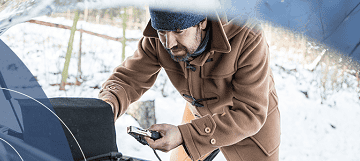The Importance of Using Strong and Secure Passwords

By: Joe Pokropski, Cybersecurity Education & Awareness at OneMain Financial and Kia Jackson
Dec 7, 2023
|4 minute read
Summary
A strong password and password manager is key to keeping your online accounts secure. Onemain tells you more.
In this article:
We spend so much of our lives online — from banking and buying to browsing and binge-watching. And the more active you are online, the longer your list of passwords seems to grow. With cybercriminals on the prowl, your passwords need to be stronger than ever. Here are some helpful tips on crafting a strong password that’s secure enough to keep the hackers scratching their heads.
How to create a strong password
Strong passwords protect sensitive information and account access. A good one has length, complexity and memorability. Do yourself a favor and resist the urge to use common passwords like “123456” or “password,” which are weak and very easily hacked.1 Instead, create a strong password with the following characteristics:
- At least 12 characters: When thinking of secure passwords, remember that longer is stronger. The more characters in your password, the harder it will be to hack!
- Complex: Use a mix of uppercase and lowercase letters, numbers and special characters to make your password stronger.
- Memorable: Consider using a phrase that isn’t easy to guess, but simple for you to recall. For a strong password example, take a phrase like Coffee for Dad, then add some complexity: Coff33FourD@d. Now you’ve created a memorable and strong password that’s hard to hack.
Password security at OneMain Financial
Customer security and password safety are a top priority at OneMain. For account access, passwords must be a minimum of 8 characters (but we recommend using passwords with 12 characters or more for enhanced security) and include three of the following:
- Uppercase characters
- Lowercase characters
- Base numbers (0 – 9)
- Special characters (!, @, #, $, %, &, *)
If a password ever needs to be reset, customers must first verify their identity through personal challenge questions or their OneMain account number. In addition, customers are never asked to share their password over the phone.
Should you use a password manager?
Password managers can be apps, browser plugins or features built into your computer operating system that help you create unusual, lengthy and strong passwords. The managers also save these secure passwords (which are usually quite hard to remember) and can fill them in for you when you visit a website. Using this feature can save you time and spare you the trouble of creating and remembering your own secure passwords. But can password managers ensure password safety?
According to the National Cybersecurity Alliance, password managers are the best way to create strong passwords for the growing list of online accounts we use.2 Good password managers use strong encryption to protect all your passwords, making it extremely tough for hackers to decode if they ever try to break into your password manager. The only way to access your secure passwords in a password manager is with a password that only you know.
Tips for managing your passwords
- Don’t recycle passwords. An important rule for password safety is to keep your passwords different from site to site. That way, if one password gets hacked, your other accounts are still protected.
- Never share your passwords. Remember, reputable financial institutions, agencies and other companies will never ask for your password.
- Don’t include personal information. Don’t base your password on information easily guessed or discovered on social media, such as your child’s or pet’s name.
- Use multi-factor authentication (MFA). Add extra layers of security by requiring additional means of identification when using your secure password to sign onto a site. This could be facial recognition, fingerprint identification, a series of personal security questions or a text message with a one-time code.
- Close accounts you no longer use. Make it a habit to review which accounts you actively use and which ones you no longer need. Unused accounts can pose a security risk online since you might not even realize if they get hacked.
Additional resources to protect yourself online
Identity theft is a serious issue that’s far too common these days. Scammers will often try to steal your password as a way to access even more of your personal information. These articles can help you learn more about protecting yourself online:
- How to Protect Your Personal Data Online
- Identity Theft: What It Is and Ways to Prevent It
- Are You at Risk for Loan Scams?
- Why You Should Avoid Social Media Quizzes
1. https://nordpass.com/most-common-passwords-list/
2. https://staysafeonline.org/online-safety-privacy-basics/password-managers/
This article is for general education and informational purposes, without any express or implied warranty of any kind, including warranties of accuracy, completeness, or fitness for any purpose and is not intended to be and does not constitute financial, legal, tax, or any other advice. Parties (other than sponsored partners of OneMain Financial (OMF)) referenced in the article are not sponsors of, do not endorse, and are not otherwise affiliated with OMF.



